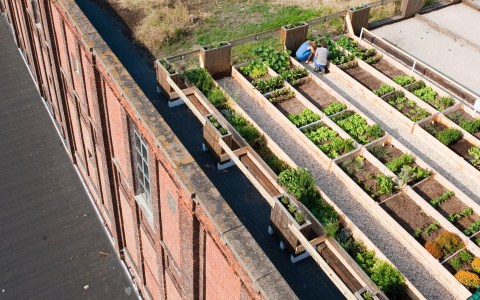One of the pioneers of the green-roof movement and founder of roof-farming company Roof Food, Sabine Windels, is moving onwards and upwards – and not only because her business is on top of other people’s roofs.
Roof Food was founded in 2014, when Windels, a recently graduated business administrator, realised that the shortage of green space in the cities could be solved by making use of the flat roofs on many commercial and industrial properties.
That was the birth of Roof Food, which took over the roof of a social enterprise centre in the Gentbrugge area of Ghent. Windels and her business partner grew produce in planters on top of the building, which was then used in the kitchen of the cooperative to make vegetarian meals for delivery.
The enterprise later moved to The Point business centre, whose roof offers a 500 square metre plot for growing food.
Six years later, she has taken some knocks, but remains convinced of the value of city farming. “With what I know now, I would do a number of things differently,” she told De Morgen. “But that is part of being a pioneer.”
Elke Rogghe, a researcher at the Institute for Agriculture and Fisheries Research (ILVO) explains the importance of urban rooftops.
“Growing food is not profitable. Freeing up urban land for agriculture is not easy, as it can be better used to build houses or businesses. But if you can combine both, then you have a win-win project,” she said. Not only does space become more efficient, people in the city are also reconnected with nature.
Windels now wants to spread her wings. “The time is right to aim further than one roof,” she said.
“We have the necessary expertise to advise project developers and architectural firms who are playing with the idea of integrating a roof garden or vegetable garden into their projects or designs. That is possible in the design phase as well as during the roll-out,” she said.
The sector is still tiny but growing. Examples are PAKT, a roof farm in Berchem in Antwerp, close to the ultra-fashionable restaurant The Jane. Or the Abattoirs project by the slaughterhouses in Anderlecht. And in Roeselare in West Flanders, home of Rodenbach beer, Agrotopia has set up 8,000 of greenhouse space on a rooftop. Their Crop on Top project received €900,000 support from the European Fund for Regional Development.
And while not all such projects can be economically viable, Elke Rogghe sees other advantages. “They can play a very important social or educational role,” she said.
“City gardens bring people together, they teach children growing up in cities to come into contact with nature. Moreover, the urban context obliges us to innovate.”
Alan Hope
The Brussels Times

